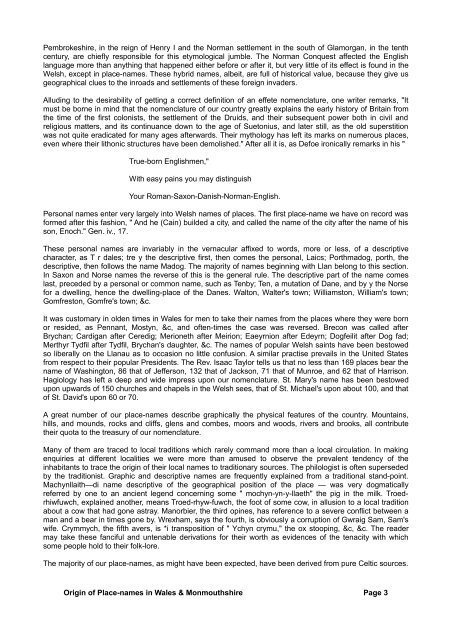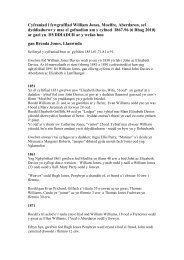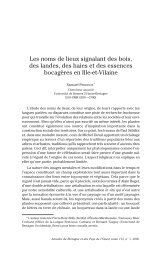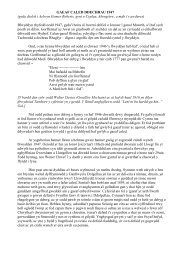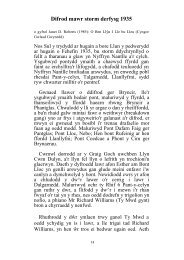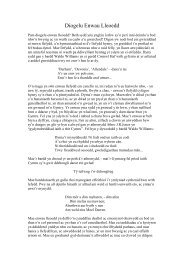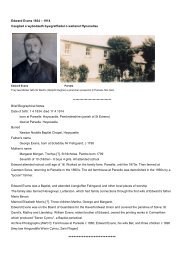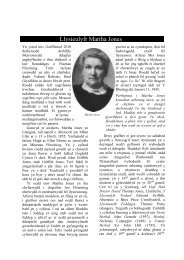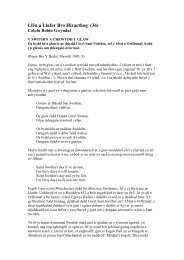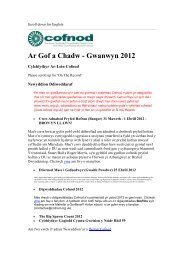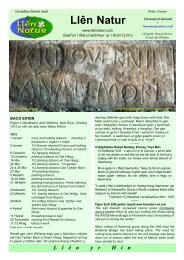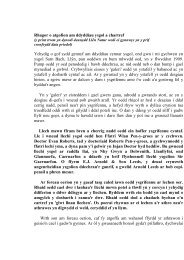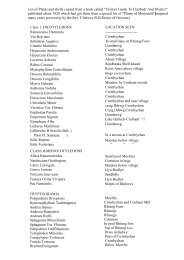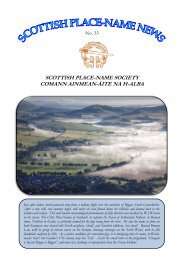Pembrokeshire, <strong>in</strong> <strong>the</strong> reign <strong>of</strong> Henry I <strong>and</strong> <strong>the</strong> Norman settlement <strong>in</strong> <strong>the</strong> south <strong>of</strong> Glamorgan, <strong>in</strong> <strong>the</strong> tenthcentury, are chiefly responsible for this etymological jumble. The Norman Conquest affected <strong>the</strong> Englishlanguage more than anyth<strong>in</strong>g that happened ei<strong>the</strong>r before or after it, but very little <strong>of</strong> its effect is found <strong>in</strong> <strong>the</strong>Welsh, except <strong>in</strong> <strong>place</strong>-<strong>names</strong>. These hybrid <strong>names</strong>, albeit, are full <strong>of</strong> historical value, because <strong>the</strong>y give usgeographical clues to <strong>the</strong> <strong>in</strong>roads <strong>and</strong> settlements <strong>of</strong> <strong>the</strong>se foreign <strong>in</strong>vaders.Allud<strong>in</strong>g to <strong>the</strong> desirability <strong>of</strong> gett<strong>in</strong>g a correct def<strong>in</strong>ition <strong>of</strong> an effete nomenclature, one writer remarks, "Itmust be borne <strong>in</strong> m<strong>in</strong>d that <strong>the</strong> nomenclature <strong>of</strong> our country greatly expla<strong>in</strong>s <strong>the</strong> early history <strong>of</strong> Brita<strong>in</strong> from<strong>the</strong> time <strong>of</strong> <strong>the</strong> first colonists, <strong>the</strong> settlement <strong>of</strong> <strong>the</strong> Druids, <strong>and</strong> <strong>the</strong>ir subsequent power both <strong>in</strong> civil <strong>and</strong>religious matters, <strong>and</strong> its cont<strong>in</strong>uance down to <strong>the</strong> age <strong>of</strong> Suetonius, <strong>and</strong> later still, as <strong>the</strong> old superstitionwas not quite eradicated for many ages afterwards. Their mythology has left its marks on numerous <strong>place</strong>s,even where <strong>the</strong>ir lithonic structures have been demolished." After all it is, as Defoe ironically remarks <strong>in</strong> his "True-born Englishmen,"With easy pa<strong>in</strong>s you may dist<strong>in</strong>guishYour Roman-Saxon-Danish-Norman-English.Personal <strong>names</strong> enter very largely <strong>in</strong>to Welsh <strong>names</strong> <strong>of</strong> <strong>place</strong>s. The first <strong>place</strong>-name we have on record wasformed after this fashion, " And he (Ca<strong>in</strong>) builded a city, <strong>and</strong> called <strong>the</strong> name <strong>of</strong> <strong>the</strong> city after <strong>the</strong> name <strong>of</strong> hisson, Enoch." Gen. iv., 17.These personal <strong>names</strong> are <strong>in</strong>variably <strong>in</strong> <strong>the</strong> vernacular affixed to words, more or less, <strong>of</strong> a descriptivecharacter, as T r dales; tre y <strong>the</strong> descriptive first, <strong>the</strong>n comes <strong>the</strong> personal, Laics; Porthmadog, porth, <strong>the</strong>descriptive, <strong>the</strong>n follows <strong>the</strong> name Madog. The majority <strong>of</strong> <strong>names</strong> beg<strong>in</strong>n<strong>in</strong>g with Llan belong to this section.In Saxon <strong>and</strong> Norse <strong>names</strong> <strong>the</strong> reverse <strong>of</strong> this is <strong>the</strong> general rule. The descriptive part <strong>of</strong> <strong>the</strong> name comeslast, preceded by a personal or common name, such as Tenby; Ten, a mutation <strong>of</strong> Dane, <strong>and</strong> by y <strong>the</strong> Norsefor a dwell<strong>in</strong>g, hence <strong>the</strong> dwell<strong>in</strong>g-<strong>place</strong> <strong>of</strong> <strong>the</strong> Danes. Walton, Walter's town; Williamston, William's town;Gomfreston, Gomfre's town; &c.It was customary <strong>in</strong> olden times <strong>in</strong> Wales for men to take <strong>the</strong>ir <strong>names</strong> from <strong>the</strong> <strong>place</strong>s where <strong>the</strong>y were bornor resided, as Pennant, Mostyn, &c, <strong>and</strong> <strong>of</strong>ten-times <strong>the</strong> case was reversed. Brecon was called afterBrychan; Cardigan after Ceredig; Merioneth after Meirion; Eaeyrnion after Edeyrn; Dogfeilit after Dog fad;Merthyr Tydfil after Tydfil, Brychan's daughter, &c. The <strong>names</strong> <strong>of</strong> popular Welsh sa<strong>in</strong>ts have been bestowedso liberally on <strong>the</strong> Llanau as to occasion no little confusion. A similar practise prevails <strong>in</strong> <strong>the</strong> United Statesfrom respect to <strong>the</strong>ir popular Presidents. The Rev. Isaac Taylor tells us that no less than 169 <strong>place</strong>s bear <strong>the</strong>name <strong>of</strong> Wash<strong>in</strong>gton, 86 that <strong>of</strong> Jefferson, 132 that <strong>of</strong> Jackson, 71 that <strong>of</strong> Munroe, <strong>and</strong> 62 that <strong>of</strong> Harrison.Hagiology has left a deep <strong>and</strong> wide impress upon our nomenclature. St. Mary's name has been bestowedupon upwards <strong>of</strong> 150 churches <strong>and</strong> chapels <strong>in</strong> <strong>the</strong> Welsh sees, that <strong>of</strong> St. Michael's upon about 100, <strong>and</strong> that<strong>of</strong> St. David's upon 60 or 70.A great number <strong>of</strong> our <strong>place</strong>-<strong>names</strong> describe graphically <strong>the</strong> physical features <strong>of</strong> <strong>the</strong> country. Mounta<strong>in</strong>s,hills, <strong>and</strong> mounds, rocks <strong>and</strong> cliffs, glens <strong>and</strong> combes, moors <strong>and</strong> woods, rivers <strong>and</strong> brooks, all contribute<strong>the</strong>ir quota to <strong>the</strong> treasury <strong>of</strong> our nomenclature.Many <strong>of</strong> <strong>the</strong>m are traced to local traditions which rarely comm<strong>and</strong> more than a local circulation. In mak<strong>in</strong>genquiries at different localities we were more than amused to observe <strong>the</strong> prevalent tendency <strong>of</strong> <strong>the</strong><strong>in</strong>habitants to trace <strong>the</strong> <strong>orig<strong>in</strong></strong> <strong>of</strong> <strong>the</strong>ir local <strong>names</strong> to traditionary sources. The philologist is <strong>of</strong>ten supersededby <strong>the</strong> traditionist. Graphic <strong>and</strong> descriptive <strong>names</strong> are frequently expla<strong>in</strong>ed from a traditional st<strong>and</strong>-po<strong>in</strong>t.Machynllaith—di name descriptive <strong>of</strong> <strong>the</strong> geographical position <strong>of</strong> <strong>the</strong> <strong>place</strong> — was very dogmaticallyreferred by one to an ancient legend concern<strong>in</strong>g some " mochyn-yn-y-llaeth" <strong>the</strong> pig <strong>in</strong> <strong>the</strong> milk. Troedrhiwfuwch,expla<strong>in</strong>ed ano<strong>the</strong>r, means Troed-rhyw-fuwch, <strong>the</strong> foot <strong>of</strong> some cow, <strong>in</strong> allusion to a local traditionabout a cow that had gone astray. Manorbier, <strong>the</strong> third op<strong>in</strong>es, has reference to a severe conflict between aman <strong>and</strong> a bear <strong>in</strong> times gone by. Wrexham, says <strong>the</strong> fourth, is obviously a corruption <strong>of</strong> Gwraig Sam, Sam'swife. Crymmych, <strong>the</strong> fifth avers, is *i transposition <strong>of</strong> " Ychyn crymu," <strong>the</strong> ox stoop<strong>in</strong>g, &c, &c. The readermay take <strong>the</strong>se fanciful <strong>and</strong> untenable derivations for <strong>the</strong>ir worth as evidences <strong>of</strong> <strong>the</strong> tenacity with whichsome people hold to <strong>the</strong>ir folk-lore.The majority <strong>of</strong> our <strong>place</strong>-<strong>names</strong>, as might have been expected, have been derived from pure Celtic sources.Orig<strong>in</strong> <strong>of</strong> Place-<strong>names</strong> <strong>in</strong> Wales & Monmouthshire Page 3
Bishop Percy says that "<strong>in</strong> Engl<strong>and</strong>, although <strong>the</strong> <strong>names</strong> <strong>of</strong> <strong>the</strong> towns <strong>and</strong> villages are almost universally <strong>of</strong>Anglo-Saxon derivation, yet hills, forests, rivers, &c, have generally preserved <strong>the</strong>ir old Celtic <strong>names</strong>." Inillustrat<strong>in</strong>g <strong>the</strong> prevalence <strong>of</strong> Celtic <strong>names</strong> <strong>in</strong> Brita<strong>in</strong>, <strong>the</strong> Rev. Isaac Taylor writes: " Throughout <strong>the</strong> wholeisl<strong>and</strong> almost every river-name is Celtic, most <strong>of</strong> <strong>the</strong> shire-<strong>names</strong> conta<strong>in</strong> Celtic roots, <strong>and</strong> a fair spr<strong>in</strong>kl<strong>in</strong>g <strong>of</strong><strong>names</strong> <strong>of</strong> hills, valleys, <strong>and</strong> fortresses, bear witness that <strong>the</strong> Celt was <strong>the</strong> ab<strong>orig<strong>in</strong></strong>al possessor <strong>of</strong> <strong>the</strong> soil;while <strong>in</strong> <strong>the</strong> border counties <strong>of</strong> Salop, Hereford, Gloucester, Dorset, Somerset, <strong>and</strong> Devon, <strong>and</strong> <strong>in</strong> <strong>the</strong>mounta<strong>in</strong> fastnesses <strong>of</strong> Derbyshire <strong>and</strong> Cumberl<strong>and</strong>, not only are <strong>the</strong> <strong>names</strong> <strong>of</strong> <strong>the</strong> great natural features <strong>of</strong><strong>the</strong> country derived from <strong>the</strong> Celtic speech, but we f<strong>in</strong>d occasional village-<strong>names</strong>, with <strong>the</strong> prefixes 'Ian' <strong>and</strong>'tre', <strong>in</strong>terspersed among <strong>the</strong> Saxon patronymics."What is true <strong>of</strong> Engl<strong>and</strong> is pre-em<strong>in</strong>ently true <strong>of</strong> Wales, where <strong>the</strong> great bulk <strong>of</strong> <strong>place</strong>-<strong>names</strong> are dist<strong>in</strong>ctlyCymric, everywhere thrust<strong>in</strong>g <strong>the</strong>mselves upon our notice as st<strong>and</strong><strong>in</strong>g pro<strong>of</strong>s <strong>of</strong> <strong>the</strong> vitality <strong>of</strong> <strong>the</strong> language <strong>of</strong>our progenitors. Many are <strong>the</strong> false prophets that have sarcastically declared, from time to time, that <strong>the</strong> days<strong>of</strong> <strong>the</strong> Welsh language have been numbered. We might observe, en passant, that it conta<strong>in</strong>s more vitalitythan <strong>the</strong> Gaelic. The latter is only talked <strong>in</strong> some parts <strong>of</strong> Scotl<strong>and</strong>, but <strong>the</strong> Cymric is <strong>the</strong> domestic language<strong>of</strong> <strong>the</strong> vast majority <strong>of</strong> <strong>the</strong> Welsh people, wheresoever situated. It is calculated that more than a million <strong>of</strong> <strong>the</strong><strong>in</strong>habitants <strong>of</strong> Wales <strong>and</strong> Monmouthshire use <strong>the</strong> vernacular <strong>in</strong> domestic conversation, <strong>in</strong> literary <strong>and</strong>newspaper read<strong>in</strong>g, <strong>and</strong> <strong>in</strong> religious exercises. What with <strong>the</strong> cont<strong>in</strong>uation <strong>of</strong> <strong>the</strong> Cymric <strong>in</strong> <strong>the</strong> curriculum <strong>of</strong>our Universities <strong>and</strong> Theological Colleges, its <strong>in</strong>troduction as a specific subject <strong>in</strong>to our public elementaryschools, <strong>the</strong> ardency <strong>and</strong> faithfulness with which it is taught <strong>in</strong> our Sunday schools from Caergybi toCaerdydd, <strong>the</strong> ever-<strong>in</strong>creas<strong>in</strong>g attention paid <strong>and</strong> <strong>the</strong> new life <strong>in</strong>fused <strong>in</strong>to it by various <strong>in</strong>stitutions, as <strong>the</strong>Eisteddfod, <strong>the</strong> Honourable Society <strong>of</strong> Cymrodorion, <strong>the</strong> Society for Utilis<strong>in</strong>g <strong>the</strong> Welsh language, <strong>and</strong> <strong>the</strong>proverbial clannishness <strong>of</strong> <strong>the</strong> Kymry; look<strong>in</strong>g retrospectively <strong>and</strong> prospectively our conviction is that <strong>the</strong> dearold language conta<strong>in</strong>s germs <strong>of</strong> a long <strong>and</strong> healthy life, <strong>and</strong> when it shall cease to be a vernacular much <strong>of</strong>its <strong>in</strong>tr<strong>in</strong>sic value <strong>and</strong> glory will be preserved <strong>in</strong> its local <strong>names</strong>.PREFIXES AND SUFFIXES.We shall now deal briefly with <strong>the</strong> chief prefixes <strong>and</strong> suffixes that occur so frequently as components <strong>in</strong><strong>names</strong> <strong>of</strong> <strong>place</strong>s <strong>in</strong> Wales, <strong>in</strong> order to avoid enter<strong>in</strong>g largely <strong>in</strong>to details <strong>in</strong> trac<strong>in</strong>g <strong>the</strong>ir <strong>orig<strong>in</strong></strong> <strong>in</strong> <strong>the</strong>subsequent pages. Many <strong>of</strong> <strong>the</strong>m conta<strong>in</strong> <strong>the</strong> geographical <strong>and</strong> historical clues to a large number <strong>of</strong> <strong>names</strong>,<strong>and</strong> s<strong>in</strong>ce <strong>the</strong>y enter so extensively <strong>in</strong>to Welsh nomenclature, we th<strong>in</strong>k it essential to <strong>of</strong>fer a few explanatorynotes <strong>the</strong>reon.Aber means <strong>the</strong> mouth <strong>of</strong> a river, a particular po<strong>in</strong>t at which <strong>the</strong> lesser water discharges itself <strong>in</strong>to <strong>the</strong> greater.In <strong>the</strong> old Welsh it is spelt aper, <strong>and</strong> Pr<strong>of</strong>essor Rhys, Oxford, derives it from <strong>the</strong> root ber, <strong>the</strong> Celtic equivalent<strong>of</strong> fer, <strong>in</strong> Lat. Fer-oe, Greek phero ΠEnglish bear. It <strong>orig<strong>in</strong></strong>ally meant a volume <strong>of</strong> water which a river bearsor br<strong>in</strong>gs <strong>in</strong>to <strong>the</strong> sea, or <strong>in</strong>to ano<strong>the</strong>r river ; but it is now generally used to denote an estuary, <strong>the</strong> mouth <strong>of</strong> ariver. Some th<strong>in</strong>k it is cognate with <strong>the</strong> Irish <strong>in</strong>ver: Inverary, mouth <strong>of</strong> <strong>the</strong> Airy; <strong>and</strong> that <strong>in</strong>ver <strong>and</strong> aber aresuitable test-words <strong>in</strong> discrim<strong>in</strong>at<strong>in</strong>g between <strong>the</strong> two chief branches <strong>of</strong> <strong>the</strong> Celts. Mr. Taylor says that "if wedraw a l<strong>in</strong>e across <strong>the</strong> map from a po<strong>in</strong>t a little south <strong>of</strong> Inverary to one a little north <strong>of</strong> Aberdeen we shall f<strong>in</strong>d(with very few exceptions) <strong>the</strong> <strong>in</strong>vers lie to <strong>the</strong> north-west <strong>of</strong> <strong>the</strong> l<strong>in</strong>e, <strong>and</strong> <strong>the</strong> abers to <strong>the</strong> south-east <strong>of</strong> it."The Welsh form occurs repeatedly <strong>in</strong> Brittany: Abervrack, Avranches. The Norman French haver is identifiedwith <strong>the</strong> Welsh abet. In <strong>the</strong> lowl<strong>and</strong>s <strong>of</strong> Scotl<strong>and</strong> we f<strong>in</strong>d it <strong>in</strong> Aberdeen, Abernethy, Abercorn, Abertay, &c,<strong>and</strong> <strong>in</strong> Engl<strong>and</strong> we f<strong>in</strong>d it <strong>in</strong> Aberford, Berwick, &c. Wherever found <strong>in</strong> Welsh <strong>place</strong>-<strong>names</strong> it is almost<strong>in</strong>variably followed by a proper or common name, <strong>in</strong>dicat<strong>in</strong>g a brook or river flow<strong>in</strong>g <strong>in</strong>to ano<strong>the</strong>r river, or <strong>the</strong>sea.Ach is a Celtic derivative particle denot<strong>in</strong>g water. Agh <strong>in</strong> Irel<strong>and</strong> means a ford, och signifies <strong>the</strong> same <strong>in</strong>Scotl<strong>and</strong>, <strong>and</strong> <strong>the</strong> Lat<strong>in</strong> aqua has <strong>the</strong> same mean<strong>in</strong>g. The Sanscrit ux, uks, means to water. We f<strong>in</strong>d manybrooks <strong>and</strong> rivers called Clydach, shelter<strong>in</strong>g water; Achddu means black water, amdgwyach is a general termfor several species <strong>of</strong> water-fowl.Afon, a river, comes probably from <strong>the</strong> Celtic awon, <strong>the</strong> mov<strong>in</strong>g water. In <strong>the</strong> Manx language it is written Aon,<strong>in</strong> <strong>the</strong> Gaelic abha<strong>in</strong>n (pronounced ava<strong>in</strong>), <strong>and</strong> <strong>in</strong> <strong>the</strong> It<strong>in</strong>erary <strong>of</strong> Antonius it is Abona. It is found <strong>in</strong> English <strong>in</strong><strong>the</strong> form <strong>of</strong> Avon, which, <strong>in</strong> <strong>the</strong> op<strong>in</strong>ion <strong>of</strong> Pr<strong>of</strong>essor Rhys, appears to have been entitled to a v as early as<strong>the</strong> time <strong>of</strong> Tacitus. This form occasions redundancy <strong>in</strong> <strong>the</strong> English language. To say " Bristol is on <strong>the</strong> riverAvon " is tantamount to say<strong>in</strong>g " Bristol is on <strong>the</strong> river river." Afon, a common name, has become a propername <strong>in</strong> Engl<strong>and</strong>, but <strong>in</strong> Wales it is <strong>the</strong> generic term for a river.Orig<strong>in</strong> <strong>of</strong> Place-<strong>names</strong> <strong>in</strong> Wales & Monmouthshire Page 4
- Page 1 and 2: HANDBOOK OF THE ORIGIN OF PLACE-NAM
- Page 3 and 4: § § § § §The Author begs to st
- Page 5: pitiful cries of the railway offici
- Page 9 and 10: The city of Chester is still popula
- Page 11 and 12: There's Cumwhitton, Cumwhinton, Cum
- Page 13 and 14: Llwyn in its primary' sense means a
- Page 15 and 16: PLACE-NAMES IN WALES.Wales. — The
- Page 17 and 18: Church are generally dedicated to e
- Page 19 and 20: think he was a contemporary of St.
- Page 21 and 22: Rhosbeirio. — Rhos, a moor, a dry
- Page 23 and 24: of Brecknock," states that this vic
- Page 25 and 26: Cam cnwir ef Cwmdu,Cwm gwyn yw & n
- Page 27 and 28: Penderyn. — A corruption probably
- Page 29 and 30: Ardudwy. — Ar, upon or above; tud
- Page 31 and 32: to mark its pre-eminence over the o
- Page 33 and 34: Some think that eirw is a corruptio
- Page 35 and 36: present form — Caerfyrddin.Abergw
- Page 37 and 38: place of refuge; hence the name. En
- Page 39 and 40: Llansawyl. — The church was dedic
- Page 41 and 42: eject. The village took its name fr
- Page 43 and 44: house, and attempted to kill an inf
- Page 45 and 46: Gwydir. — Prima facie one may tak
- Page 47 and 48: Nefyn. — The church was probably
- Page 49 and 50: DENBIGHSHIRE.Anglicized form of Din
- Page 51 and 52: Llangollen. — From Collen, a sain
- Page 53 and 54: hands into their pockets to pay a c
- Page 55 and 56: Cefn. — The name signifies a ridg
- Page 57 and 58:
Maesgarmon. — Named in honour of
- Page 59 and 60:
Abertridwr. — Tridwr, three water
- Page 61 and 62:
it is said, was originally built by
- Page 63 and 64:
Cwmllynfell. — Cwm, a narrow vale
- Page 65 and 66:
Gwarycaeau. — Gwdr, the nape of t
- Page 67 and 68:
means a cultivated region, a vale,
- Page 69 and 70:
Penrhiwfer.- Pen, head, top; rhiw,
- Page 71 and 72:
Port Talbot. — So called in 1835
- Page 73 and 74:
Trealaw. — This appellation was g
- Page 75 and 76:
Aberdyfi. — So called from its si
- Page 77 and 78:
Llanddwywe. — From Dwywau, a desc
- Page 79 and 80:
Crickhowell and some in the directi
- Page 81 and 82:
Griffithstown. — This village was
- Page 83 and 84:
and gwy, water. Treiddiod troth tna
- Page 85 and 86:
derive Tintern from din, fortified
- Page 87 and 88:
Caersws. — It appears that the Ro
- Page 89 and 90:
English name — Ervylton.Llanymech
- Page 91 and 92:
Angle. — Probably from the angle-
- Page 93 and 94:
Gellyswick. — Another hybrid. Gel
- Page 95 and 96:
that the two rivers in their flowin
- Page 97 and 98:
ecame the bishop of the see, and wa
- Page 99 and 100:
earth formerly stood on a summit on
- Page 101 and 102:
Pilleth. — A corruption of pwll,
- Page 103 and 104:
Howells, Rev. J., Mountain AshHowel
- Page 105 and 106:
Williams, D., PenywernWilliams, Rev


